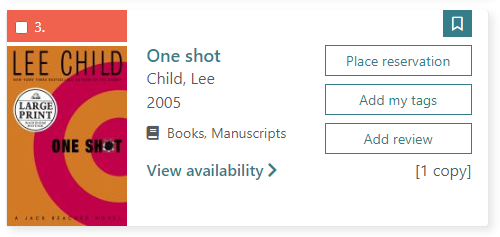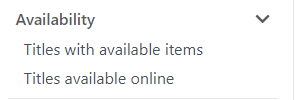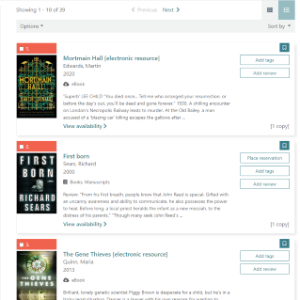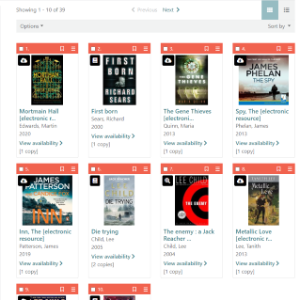This section is where libraries can manage a number of aspects related to the display of search result sets in the OPAC.
Brief Display default view
This option controls whether - by default - search results display in a list or grid view.
|
Users can toggle grid or list display at the OPAC by clicking the icon at the top of the Brief Display interface. |
 |
Number of records per page
This controls the default number of records shown per page of search results.

Max page number in brief display
This controls the number of results pages shown at the bottom of a search page. In the screenshot below, the value is set to 7.

Enable the Add Review button
|
This feature requires server version 10.6.1 or higher. |
Check this box to display the Add Review button at record Brief Display, or un-check to disable.

Facets
Show facets as an accordion
If selected, facets will only allow one section to be expanded open at a time. Selecting another option in the menu will automatically collapse the other facet menus.
Enable facet refine using the 'NOT' operator
Allows borrowers to use the term 'NOT' when using facets to refine their set of results. e.g. Animals NOT reptiles.

Maximum number in set to allow availability facets
If there are more than {x} results, the availability facet will not be shown. It is not recommended to set this to more than 100,000.

Enable "Available Item" facets
If selected, borrowers will be able to refine a set of records to those that have items availabile to loan.
Enable "Online Item" facets
If selected, borrowers will be able to refine a set of records to those that are available online.
External links
If enabled, links to external search sources will appear at the top of a search result page, allowing users to click through and perform the search on the selected site. In the screenshot below, Trove, Google and RSS feed links are enabled.

Links to perform these searches will also appear when a Spydus search returns no results.
Enable link to Trove Search
Add external links to search Trove, the Australian online library database aggregator.
Enable link to National Library of Australia Search
Add external links to search the NLA database.
Enable link to Google Search
Add external links to search Google.
Enable link to Google Books Search
Add external links to search Google Books.
Enable link to RSS feed
If selected, a RSS button will be available at the top of brief display of records. An RSS link will not be generated for searches with no results.
Number of items per RSS page
This will set the maximum number of records that will be listed on the RSS page when the RSS function is used.
Enable search other libraries link
This allows users to search the catalogues of other libraries that have been configured for the OPAC using the External Sites Editor.


